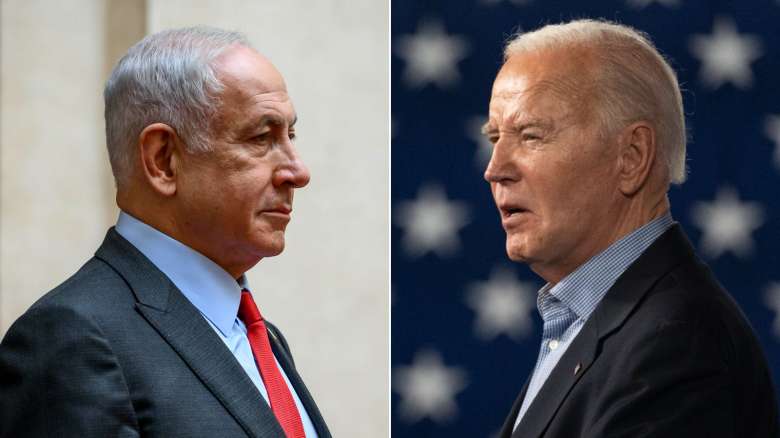Blinken, who was in Brussels, held a televised press conference, speaking to Americans back home as well as US allies who have been far more ready to rebuke Israel for the conduct of the war than Biden. Then at the White House, National Security Communications Adviser John Kirby took up the baton, stressing that the US wanted to see changes from Israel – including the opening of more aid corridors into Gaza and measures to protect civilians – implemented straight away.
It’s unusual for an administration to brief a call with a foreign leader so fulsomely and publicly. Usually, the White House issues a statement offering few useful details of a conversation. This time, however, the administration was determined to control the narrative and defined what happened before Israel offered its own version of events. Biden didn’t appear before television cameras but posted a photo on X in which he stared pensively at a telephone during the call with a pen to his lips. “Israel must implement steps to address civilian harm and the safety of workers – and work toward a ceasefire to bring hostages home,” the president wrote. This coordinated public diplomacy underlined the gravity of a US shift. But it also increased the cost to Washington if Netanyahu doesn’t play along.
Leon Panetta, a former White House chief of staff, CIA director and defense secretary, told CNN’s Jake Tapper on Thursday that he believed the administration’s drawing of a line with Israel could be effective and that it was important Biden called for a ceasefire. “This war has gone on for almost six months, and I think to some extent, I think President Biden and Netanyahu have been talking past each other when it comes to their concerns. I think that has changed. … I hope that has changed,” he said.
Independent Sen. Bernie Sanders, who has been speaking out against Israel’s strategy in Gaza, said that American taxpayer dollars should not be “complicit” in allowing Israel to kill innocent people. “The bottom line, we are looking at one of the worst humanitarian disasters that we have seen in a very, very long time,” the Vermont senator told Tapper. “To my mind, Israel should not be getting another nickel in military aid until these policies are fundamentally changed,” Sanders said. “Hamas began this war, they are a terrorist organization, but the United States is not funding Hamas, we are funding Israel … what has got to be made clear to Israel is that you can go to war against Hamas, but you cannot continue these horrific actions.”
Netanyahu’s choice
Netanyahu, who has been in power for much of the last quarter century and is an extraordinary political survivor, has a long record of defying US pressure – one reason why dealing with him has been so treacherous for American presidents.
There was no immediate response from the prime minister, who held a cabinet meeting after the call that he used to warn that Israel will defend itself against Iran. The Islamic Republic issued warnings of retaliation after two senior Islamic Revolutionary Guard Corps officers were killed in a strike in Damascus that the United States has attributed to Israel. The Israeli government put its forces on a state of high alert Thursday, and suspended leave for combat units. “We will know how to defend ourselves and we will act according to the simple principle of whoever harms us or plans to harm us, we will harm them,” Netanyahu said.
While the telephone call with Biden laid bare differences between the Israelis and the Americans, the administration also made a point of stressing that the US support for Israel’s security was inviolate. “They did talk about a very public and very viable real threat by Iran to Israel’s security,” Kirby said. Blinken, meanwhile, stressed that “President Biden reaffirmed the United States’ strong support for Israel in the face of these threats and our commitment to Israel’s security.”
Tensions have not been rising between the Israeli prime minister and Biden because of a personal disconnect. The two are veteran politicians who have known one another for years. Rather the president’s political interests – and arguably US national security interests – are diverging with those of Netanyahu. Biden has a strong incentive for the war to end, given the political blowback he is facing from within his fragile coalition in key states that will decide the 2024 election. Many Washington observers believe that Netanyahu has an incentive to prolong the conflict, given that an election is likely when the intensity of conflict cools. At that point, the focus will also turn to accountability for the worst terror attack in modern Israeli history and a period that is likely to be damning for Netanyahu, who presented himself to Israelis as the ultimate guarantor of their security.
One of the most notable features of Netanyahu’s strategy in recent months has been his unwillingness to pay even symbolic lip service to US needs given the political price that Biden is paying in return for his staunch support for Israel. On one hand, that is not surprising. For many Israelis, the horror of the October terror attacks and the depravity of an enemy that wants to wipe it off the map has overshadowed other considerations. Netanyahu, who has tracked far to the right over his career, also runs the most conservative government in Israeli history and is dependent on several extreme Orthodox parties to remain in power. The Israeli prime minister is a consummate Washington player and has been engaging with Biden’s Republican foes on Capitol Hill, in an alliance that could increase political complications for the president if he creates deeper fractures with the Israeli prime minister. Reinforcing the synergy between Netanyahu and the GOP, House Speaker Mike Johnson warned in a post on X, “The President’s ultimatums should be going to Hamas, not Israel.”
Still, Israel is becoming increasingly isolated internationally, and US support has rarely been so critical. Netanyahu would be taking a huge risk of his own if he openly defies public requests of a US president. A planned Israeli offensive in Rafah, which the US has warned must not go ahead until civilians are safeguarded, now looms as a potential breaking point between the two leaders.
If Biden eventually assesses his warnings are falling on deaf ears, his credibility will depend on him publicly imposing a cost on the Israeli prime minister. He will do so with a heavy heart, given his deep emotional bond with Israel.
But Biden’s political imperatives and the increasing humanitarian price of the war in Gaza mean he’s approaching a fateful crossroads. And now Netanyahu will decide which path he will take.






 ICC may discuss issue of Netanyahu's arrest
ICC may discuss issue of Netanyahu's arrest Overchuk: Russia awaits Armenia's Pashinyan at EAEU summit in Moscow
Overchuk: Russia awaits Armenia's Pashinyan at EAEU summit in Moscow US President Joe Biden releases Armenian Genocide Remembrance Day statement
US President Joe Biden releases Armenian Genocide Remembrance Day statement In conversation with Zelensky, Biden expressed hope that Senate would approve $61 billion aid package for Ukraine
In conversation with Zelensky, Biden expressed hope that Senate would approve $61 billion aid package for Ukraine Papua New Guinea leader takes offense after Biden implies his uncle was eaten by cannibals
Papua New Guinea leader takes offense after Biden implies his uncle was eaten by cannibals Netanyahu vows to fight possible U.S. sanctions on Israeli army units
Netanyahu vows to fight possible U.S. sanctions on Israeli army units Erdogan says Netanyahu to blame for Iran's attack on Israel
Erdogan says Netanyahu to blame for Iran's attack on Israel Biden says Netanyahu's approach to war in Gaza is a 'mistake’
Biden says Netanyahu's approach to war in Gaza is a 'mistake’ Council of Europe to present response package to refugee influx in Armenia
Council of Europe to present response package to refugee influx in Armenia There is a date for Rafah invasion, Israel's Netanyahu
There is a date for Rafah invasion, Israel's Netanyahu


















































 Most Popular
Most Popular 
 Cyberattack forces Georgia county to sever connection to state voter registration system
Cyberattack forces Georgia county to sever connection to state voter registration system






















